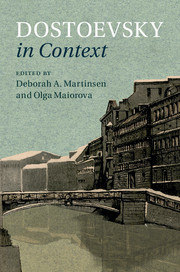Book contents
- Frontmatter
- Contents
- List of illustrations
- Notes on contributors
- Acknowledgments
- Note on citation, transliteration, glossary, and dates
- Chronology
- 1 Introduction: the many worlds of Dostoevsky
- PART I SOCIAL, HISTORICAL, AND CULTURAL CONTEXTS
- i CHANGING POLITICAL, ECONOMIC, AND SOCIAL LANDSCAPE
- ii POLITICAL, SOCIAL, AND CULTURAL INSTITUTIONS
- 9 Russian monarchy and the people
- 10 Empire
- 11 Service ranks
- 12 Education
- 13 Science, technology, and medicine
- 14 Jews, race, and biology
- 15 Suicide
- 16 Children
- 17 Gambling
- iii SPACE AND PLACE
- iv RELIGION AND MODERNITY
- PART II LITERATURE, JOURNALISM, AND LANGUAGES
- Glossary
- Further reading
- Index
- References
12 - Education
from ii - POLITICAL, SOCIAL, AND CULTURAL INSTITUTIONS
Published online by Cambridge University Press: 18 December 2015
- Frontmatter
- Contents
- List of illustrations
- Notes on contributors
- Acknowledgments
- Note on citation, transliteration, glossary, and dates
- Chronology
- 1 Introduction: the many worlds of Dostoevsky
- PART I SOCIAL, HISTORICAL, AND CULTURAL CONTEXTS
- i CHANGING POLITICAL, ECONOMIC, AND SOCIAL LANDSCAPE
- ii POLITICAL, SOCIAL, AND CULTURAL INSTITUTIONS
- 9 Russian monarchy and the people
- 10 Empire
- 11 Service ranks
- 12 Education
- 13 Science, technology, and medicine
- 14 Jews, race, and biology
- 15 Suicide
- 16 Children
- 17 Gambling
- iii SPACE AND PLACE
- iv RELIGION AND MODERNITY
- PART II LITERATURE, JOURNALISM, AND LANGUAGES
- Glossary
- Further reading
- Index
- References
Summary
Dostoevsky was born at the close of Alexander I's reign (1801–25), when Russia's system of education was first standardized after being introduced by Peter the Great (1682–1725). In the early nineteenth century, Russia was predominantly illiterate and lacked a nationwide system of formal schooling; the elite minority had a Western education of uneven variety and quality. Recognizing the need to strengthen and expand the universities and secondary schools, Alexander I divided the country into educational districts and established the Ministry of Education or, if translated literally, the Ministry of National Enlightenment (1802).
The inculcation of enlightenment by autocratic fiat influenced the next three phases of reform in the educational system that occurred during Dostoevsky's life: under Nicholas I (1825–55) and his Minister of Education Sergei Uvarov in the 1830s and early 1840s; under Alexander II (1855–81), who introduced liberal reforms in the mid-1860s and then scaled them back; and under Alexander II's reactionary Minister of Education Dmitry Tolstoy (1866–80) in the 1870s. The tension between modern education and its relation to traditional Russian upbringing fueled the public debates over education, which matured in the 1860s and 1870s. Dostoevsky plunged ardently into these debates. As part of the ideology of the soil (pochvennichestvo*) he developed in his 1860s journalism, Dostoevsky advocated the union of Western learning with the Orthodox beliefs preserved by the narod* (common people).
Although his background included a strong religious component, Dostoevsky's education during his childhood and early youth otherwise mirrored the trends prevalent among the educated classes. From 1834 to 1837, he attended the Chermak Private Boarding School in Moscow and from 1837 to 1841 the Academy of Engineers in St. Petersburg, which was personally supervised and patronized by Nicholas I. The curriculum at these well-endowed schools included classical and modern authors mixed with eclectic topics of general interest. At the Academy of Engineers Dostoevsky also received technical and special military training.
- Type
- Chapter
- Information
- Dostoevsky in Context , pp. 106 - 113Publisher: Cambridge University PressPrint publication year: 2016

